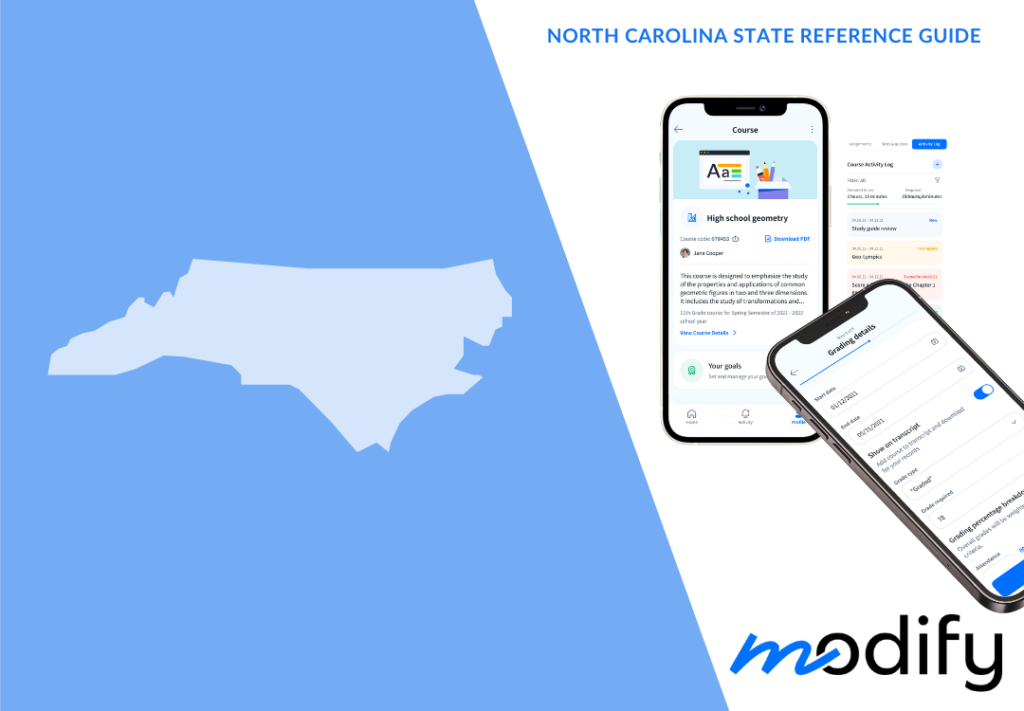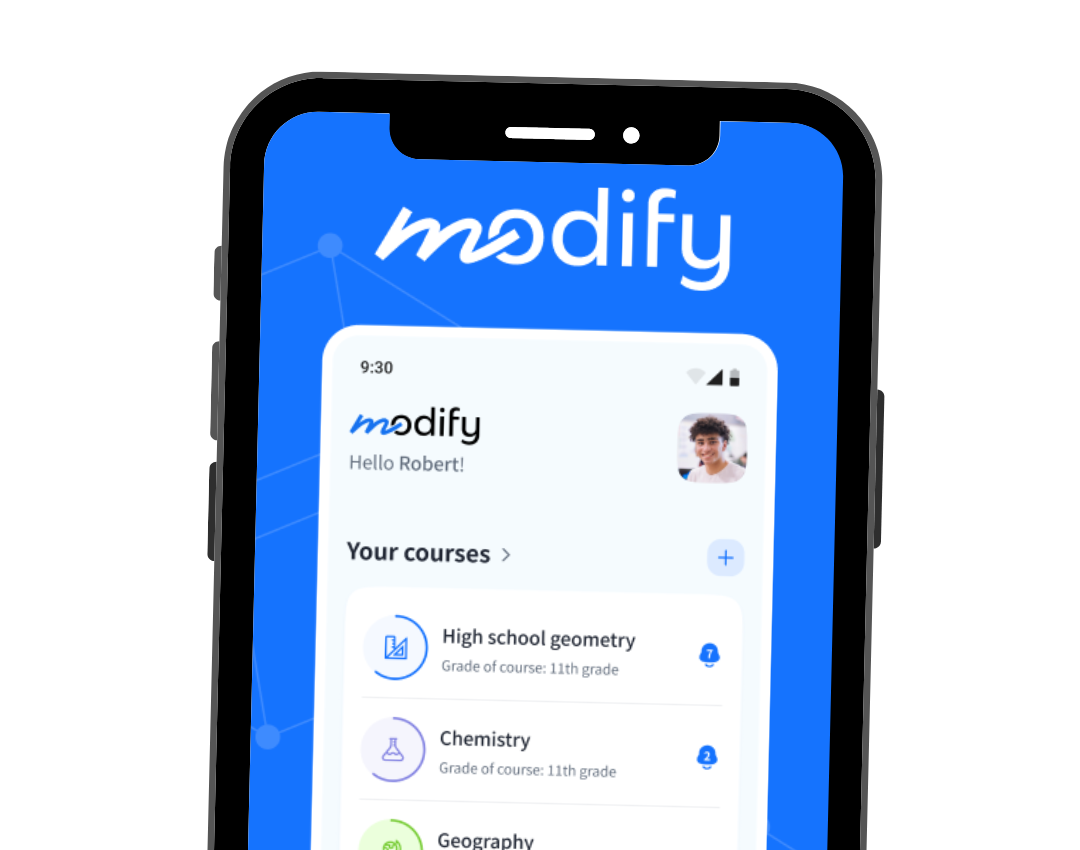North Carolina Homeschool Laws
Homeschooling in North Carolina
How do I start homeschooling?
The process for starting to homeschool in North Carolina is simple and straightforward.
To begin homeschooling any child who is at least seven years old , you will need to:
File a notice of intent to homeschool with the NC Division of Nonpublic Education (NCDNPE)
Submit proof that you, the parent, have a high school diploma (or equivalency)
Name your school
Choose an ideal curriculum for your family.
Modify™ can help you with your tracking, portfolio and record keeping. Download the app today.
Enjoying learning together!
Homeschool Laws
According to North Carolina Statute § 115C-378, “Every parent, guardian or custodian in this State having charge or control of a child between the ages of seven and 16 years shall cause the child to attend school continuously for a period equal to the time which the public school to which the child is assigned shall be in session. Every parent, guardian, or custodian in this State having charge or control of a child under age seven who is enrolled in a public school in grades kindergarten through two shall also cause the child to attend school continuously for a period equal to the time which the public school to which the child is assigned shall be in session unless the child has withdrawn from school.”
Per the North Carolina Department of Public Instruction, a homeschool is defined as “a non public school consisting of the children of not more than two families or households, where the parents or legal guardians or members of either household determine the scope and sequence of the academic instruction, provide academic instruction, and determine additional sources of academic instruction. General Statute 115C-563(a) as amended changes the definition of a home school to allow parents to hire tutors, let their children participate in group settings where they receive instruction (co-ops, 4-H classroom instruction, etc.) and be instructed by an expert that is not a part of the household in the established homeschool (apprenticeships, a homeschool doctor teaching biology, etc.). This will allow homeschool parents more freedom to choose what is best for the education of their children.”
Note, “The North Carolina Division of Non-Public Education (DNPE) is authorized by state law to receive home school notices of intent to begin initial operation and to terminate operation, and to annually inspect the school’s student attendance and nationally standardized achievement test result records. Chief Administrators of home schools should anticipate receiving a request(s) to meet with a DNPE representative at a public location in close proximity to the home school while the home school is in operation” (North Carolina Department of Public Instruction).
What do I need to be eligible to be a homeschool parent?
To homeschool your child in North Carolina, you must hold at least a high school diploma or its equivalent. “For parents/guardians living in households where there are no resident adults who possess a high school diploma (or its equivalent), there are two options available to legally have their children (of compulsory attendance age) home educated.
- First, the parent/guardian may contact the GED (General Equivalency Diploma) test coordinator at a local community college and make arrangements to acquire a GED (or to enroll in the Adult High School Diploma Program there). The GED usually costs less than $10 but takes about 6 – 10 weeks to obtain.
- Second, the parent/guardian might consider approaching the chief administrator of an existing legal home school and ask if he/she would consider enrolling the child in that home school to be taught weekdays on a regular basis by that parent in this already established home school” (North Carolina Department of Public Instruction).
Do I need to notify the school district of my intent to homeschool my child?
Yes! You must send a Notice of Intent to Operate a Home School to the Division of Non-public Education five days prior to the home school’s initial opening date and after July 1 of the school year (July 1-June 30) in which your homeschool will be operating. Notices of Intent are not accepted in May and June. The Notice must include the name and address of the school and the name of the chief administrator, as well as the school name. According to the North Carolina Department of Public Instruction, the school name must follow these guidelines:
- “Choose a simple name appropriate for inclusion on the student’s future high school diploma and transcript (which will be issued by your individual school). DNPE will not be able to accommodate requests to change the school name once your file is opened.
- The School Name must not exceed 30 characters in length (including spaces and punctuation).
- Do not use the following words in your school name: Charter, college, elementary, grade, grammar, high, incorporated (or Inc.), junior, kindergarten, lower, middle, primary, public, residence, schooling, secondary, seminary, senior, the, university or upper.
- Do not use the name of your curriculum in your school name, even if you are registered with an accredited distance learning program. Example of names NOT allowed: ABEKA, BJU, Bob Jones, Keystone, Liberty, Time for Learning, James Madison, Penn Foster, etc.
- Do not use A or THE at the beginning of your school name.
Any school submitting its Notice of Intent without providing a school name will automatically be assigned a school name as follows: Last name of Chief Administrator + School (Example: Smith School).”
You must also elect whether you will be operating “under either Part 1 or Part 2 of Article 39 of the North Carolina General Statutes as a religious or as a non-religious school” (North Carolina Department of Public Instruction).
“When sending your Notice of Intent to DNPE, always include diploma documentation for all persons named as a provider of academic instruction. Be sure to include the name of the parent/legal guardian who is usually with the student during the day while other area children are normally attending local schools” (North Carolina Department of Public Instruction).
“Upon receiving from DNPE a Notice of Intent to Operate a Home School acknowledgment, show it to the appropriate official in the local school in which the student is currently enrolled” in order to withdraw your child from public school. Remember, “Do not withdraw your child from his/her present school or begin your school until you have received written acknowledgment from DNPE that your completed Notice of Intent to Operate a School form has been received.”
What educational options are available to my homeschooler?
You may also send your child to an already established homeschool with another family: According to the Home School Guidebook: “If a home school (household A) currently listed with DNPE is teaching students who are of North Carolina compulsory attendance age (at least age 7 but not yet age16) and who live in the house wishes to also teach students from ONE additional household (household B), the home school may legally do so.”
Also, once a home school is established, “a North Carolina family may legally enroll its students in a distance learning program (such as a correspondence, internet-based, or audio/video program), and utilize that organization’s textbooks, curriculum, learning materials, etc.” Homeschooled students may also be enrolled in the N.C. Virtual Public School program but will be assessed course fees.
Finally, you may have the option to enroll your child part-time in a local school or community college: “For students who are at least age 16, enrollment in either a local conventional school or college is permissible. For students who are of compulsory attendance age (at least age 7, but not yet age 16), it is permissible if the local conventional school (public or non-public) or college officials allow such part-time arrangements. College level courses (not high school), however, may be taken part-time in any subject at local colleges (either community or four-year, degree-granting colleges/universities). Each local education agency (LEA) may have different policies relating to the enrollment of homeschool students in one or more public school courses. Please inquire of the LEA about their policies on enrolling a homeschooled student in one or more courses and how the student will be classified by the system (as either a visiting student or a public school student of the LEA).” Contact your local community college for options related to the Career and College Promise program.
Homeschool Requirements
Even though North Carolina does not highly regulate homeschooling, there are some North Carolina homeschool requirements you must satisfy when you homeschool:
Begin homeschooling by age 7.
File the required Notice of Intent to the Division of Non-Public Education to indicate your homeschool’s initial opening. Note that you should not resubmit the Notice of Intent annually even if you are adding another child (simply update the enrollment annually).
Provide instruction “on a regular schedule for at least nine calendar months of the year, excluding holidays and vacations” (180 days is recommended).
Provide instruction for at least five clock hours each school day that is of “at least similar quality, scope and duration as local conventional schools” (recommended but not required).
Administer a nationally standardized test each year to each child.
Notify the Division of Non-public Education when the homeschool is no longer in operation by calling the DNPE office at (984) 236-0110 or submitting the Home School Updates and Changes form.
Stay current with homeschooling laws and requirements.
Do I need to administer testing to my homeschooler?
Yes. According to the North Carolina Department of Public Instruction, homeschools must “have a nationally standardized achievement test administered annually to each student. The test must involve the subject areas of English grammar, reading, spelling, and mathematics. Records of the test results must be retained at the home school for at least one year and made available to DNPE when requested. The first standardized test must be administered within one year of the home school start date, and then annually thereafter.”
Note that “North Carolina home school law does not mandate that the student achieve a certain minimum score on the nationally standardized test in order for the parent/guardian to be legally permitted to continue to home school that student during the following (or any future) school year” (North Carolina Department of Public Instruction). See here for more information on required homeschool testing.
What records do I need to keep when I homeschool my child?
The North Carolina Department of Public Instruction requires that you keep certain records. You must, for example, “maintain at the school disease immunization and annual attendance records for each student.” In fact, immunization records are required to begin your new home school. Homeschool records may be requested for review by the state or local health inspectors on an annual basis. If your homeschool has met the legal requirements and is therefore considered a non-public school, you may choose to obtain and keep a photocopy of a student’s cumulative record from a previous school, and you should maintain any transcripts from courses at a high school or college.
The Department also recommends that you “maintain a current daily log, journal or lesson plan book throughout the entire school year detailing time period for each subject each day and information covered during the specified time period” and that you “retain records at your school until the student has enrolled in a conventional school or has graduated. (It is a good idea to keep this information indefinitely.)”
In addition to the required recordkeeping, we also recommend you do some personal recordkeeping to provide verification of education in the event you would need to show some form of educational proof to the state or other legal entities or to prepare for re-entry into public school or postsecondary pathways. This includes the following:
- Attendance, required
- Immunization records, required
- Lists of texts and workbooks used
- Student schoolwork samples and/or portfolios
- Test and evaluation results
- Correspondence with school officials
- Copy of the homeschool registration/verification record
You may also be able to find more information on North Carolina homeschool requirements through your local school district.
Record Keeping
The records that homeschoolers are required to keep in North Carolina do not have to be submitted to the NCDNPE unless specifically requested. However, it is a good idea to keep a detailed, accurate, and professional homeschool portfolio of items for each student.
The Modify™ app makes record keeping simple and keeps all your records organized.
Graduation requirements
North Carolina allows each homeschool sets their own graduation requirements.
Modify™ helps homeschoolers to keep all necessary records and transcripts.

REFERENCE GUIDE:
North Carolina Statute § 115C-378
General Statute 115C-563(a)
Notice of Intent to Operate a Home School
Nationally Standardized Achievement Test
Note: All information on this site is provided with no guarantee of accuracy. Modify™ is not responsible for any errors, omissions, or outdated information, or for the results yielded through use of this information.





